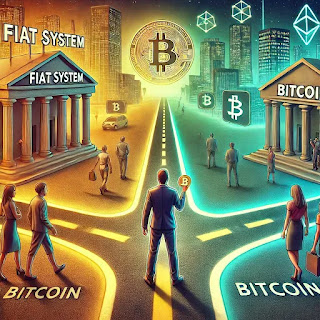The Internet Didn’t Need Government Approval—Neither Does Bitcoin
The Internet Wasn’t Built by Permission—It Was Built by Persistence
Imagine if the internet had needed full government approval before it could be unleashed. What if we had to get permission from bureaucrats before sending an email, browsing a website, or streaming a video? The reality is, if the internet had required centralized authorization, it might never have reached the masses. Instead, it grew organically, driven by visionaries who saw its potential long before regulators caught up.
Bitcoin is following the same trajectory.
Both the internet and Bitcoin are decentralized, disruptive technologies that thrive without permission. The internet revolutionized communication. Bitcoin is revolutionizing money. And just like the internet, Bitcoin doesn’t need government approval to succeed—it just needs time.
The Internet’s Struggle for Legitimacy—A Mirror for Bitcoin
When the internet first emerged, governments and corporations tried to control it. They feared its open nature, the free flow of information, and the economic disruption it could bring. Sound familiar? It should, because Bitcoin is facing the same resistance today.
Let’s rewind to the early days of the internet:
Skepticism: In the 1990s, people dismissed the internet as a niche tool for hobbyists.
Ridicule: Major news outlets questioned whether it would ever be widely used.
Resistance: Governments and telecom giants sought ways to regulate and restrict it.
Yet, despite the opposition, the internet exploded because it was useful and unstoppable. No government could control every node, every server, or every network. It belonged to the people, not institutions.
Bitcoin is now experiencing the same cycle:
Dismissed as a toy for geeks in its early days.
Mocked by financial institutions as a speculative bubble.
Attacked by governments that feel threatened by its ability to bypass traditional financial systems.
And just like the internet, Bitcoin will emerge victorious because decentralization is a force no government can contain.
The Failed Attempts to Stop the Internet (and Why Bitcoin Will Survive, Too)
Governments have tried to regulate, censor, and control the internet, but they’ve always been met with resistance:
China’s Great Firewall: A massive attempt to limit access to global content. Yet, people still use VPNs and decentralized networks to bypass censorship.
Net Neutrality Wars: Attempts by ISPs to prioritize certain traffic were met with backlash, and the fight for a free internet continues.
Government Surveillance (e.g., NSA Spying): Whistleblowers like Edward Snowden exposed mass surveillance, leading to a boom in encryption and privacy tools.
Every attempt to control the internet has resulted in stronger, more decentralized alternatives. Bitcoin operates on the same principle. Every time a government tries to ban it, Bitcoin adapts:
China bans mining? Miners relocate and strengthen decentralization.
Regulators restrict exchanges? Peer-to-peer transactions rise.
Banks try to block access? The Lightning Network offers alternative payment rails.
Bitcoin is an idea, and ideas cannot be stopped. Governments can pass all the regulations they want, but they cannot stop a global, decentralized network of nodes validating transactions and securing the system.
Why Bitcoin Thrives Without Approval
Bitcoin doesn’t ask for permission. It simply is. Here’s why it thrives:
1. No Single Point of Failure
Like the internet, Bitcoin operates across thousands of nodes worldwide. Shutting down one country’s access doesn’t kill the network; it only strengthens it elsewhere.
2. Peer-to-Peer Resilience
When social media platforms censor content, decentralized alternatives like Nostr emerge. When governments try to ban Bitcoin, peer-to-peer transactions skyrocket.
3. A New Form of Value Exchange
The internet removed the need for middlemen in communication. Bitcoin removes the need for middlemen in finance. Just as we no longer need postal services for instant messages, we no longer need banks for instant value transfers.
Bitcoin isn’t just money—it’s a monetary revolution.
The Adoption Curve: Bitcoin Is Inevitable
History repeats itself. The internet was ignored, then ridiculed, then attacked—before it became essential. Bitcoin is following the same adoption curve.
Ignored: 2009-2012—Early cypherpunks and libertarians experiment with Bitcoin.
Ridiculed: 2013-2016—Media mocks Bitcoin as a tool for criminals and a passing trend.
Attacked: 2017-Present—Governments attempt regulations, bans, and smear campaigns.
Adopted: Future—Bitcoin becomes too useful to ignore, just like the internet.
The final stage? Widespread adoption.
Conclusion: Permissionless Innovation Always Wins
The lesson from the internet is clear: decentralized systems that provide real value cannot be stopped.
Bitcoin, like the internet before it, is a paradigm shift that doesn’t need permission to succeed.
Governments will resist, regulators will scramble, and traditional institutions will fight tooth and nail to hold onto power. But in the end, Bitcoin doesn’t need their approval—just as the internet never did.
Tick tock, next block.




Comments
Post a Comment